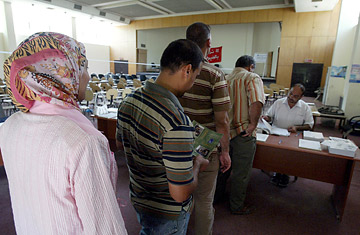
Employees of Iraq's Independent Electoral Commission register voters in an election station in Baghdad, Iraq.
Iraq's Electoral Commission wants the country's squabbling parliamentarians to buckle down and agree to a contentious electoral law within the next few weeks. Otherwise, the much-anticipated and much-delayed provincial polls may be put off yet again. Washington, too, is anxious to see Iraqis head to the ballot box and shore up their fledging democracy. In spite of the high-level political anxiety, however, many ordinary people across the war-ravaged capital say that while elections would be nice, regular power and clean water is what they really want. Few feel that local elections will improve their lot.
Five years after the fall of Saddam Hussein's dictatorial regime, the novelty of elections has worn off, and Baghdad's war-weary citizens are still hoping for basic services. Many don't expect much help from local elected officials. According to the Iraqi Electoral Commission, of the 17 million registered voters during the last vote, only two million have come to election centers to check their registration. That may be because parliament hasn't even agreed on an electoral law, let alone a new date, although polls were originally slated for October. It may also be a measure of voter apathy.
That apathy emerges even as Baghdad grows safer and business picks up. The dramatic drop in violence has resurrected many of Baghdad's once desolate and dangerous streets, turning them into bustling, pedestrian filled walkways, with stall-owners peddling their wares on the sidewalk. Traffic-clogged streets echo with a cacophony of car horns. But there are other, less-progressive sounds that are common to Baghdad too: the dull, almost constant hum of private power generators and the sloshing of water being emptied from delivery trucks into rooftop storage units. The city's power supply is delivered in fitful bursts for just a few hours a day, which in turn hampers the ability of Baghdad's decrepit water-pumping plants to function efficiently.
"They haven't done anything," Amar, a 35-year-old from the mainly Shiite district of Karrada, says of the politicians he helped elect in the 2005 parliamentary polls. He remembers with pride emerging from the ballot box with a purple, ink-stained index finger. "This time I won't have a purple finger, and I think the majority of people won't," he says, bitterly. "I want to vote for people who will help us, but I don't see any."
Talat Abdel-Latif, 43, a clothing store owner from the same district, is also abstaining, after having voted in 2005. He doesn't know the members of his local council, and says they haven't done anything for him anyway. He's more interested in the U.S. elections, which he's been keenly observing, and his money's on John McCain. "I know about what George Bush and the candidates have done for their country, I don't know what my local council has done for me," he says. "I want my area rebuilt, I want electricity; the same thing every citizen wants. I don't think elections will deliver that."
At issue in the elections, however, are more than bread-and-butter or water-and-power. The vote in the capital and in the provinces will help determine how much support politicians like Prime Minister Nouri al-Maliki have within their own communities, and could precipitate a three-way Shi'ite power struggle among Maliki's allies, radical cleric Moqtada al Sadr's movement and loyalists of Abdel-Aziz al Hakim, who heads the Supreme Iraqi Islamic Council in Baghdad.
Some voters are keenly aware of what's at stake in the yet unscheduled polls. "I stayed here throughout the war, and experienced many difficulties, so it's my right to experience the freedom of the Iraqi people as well," says May Razook, a 35-year-old Christian who was shopping in the capital's Karrada district. "I want to be the first to vote. The Iraqi people should take their freedom, it's our right." Ahmad Salem, 45, a bank employee from the Sunni district of Adhamiya west of Baghdad, says that this election will be "a real battle." It won't have a sectarian hue, he says, but will pit "those who are really trying to serve the country and those who are trying to fill their pockets with money." Like many of his Sunni co-religionists, Salem boycotted the previous local polls, but says this round will help give voice to his once-powerful community. "We don't want to miss this chance as we did before."
